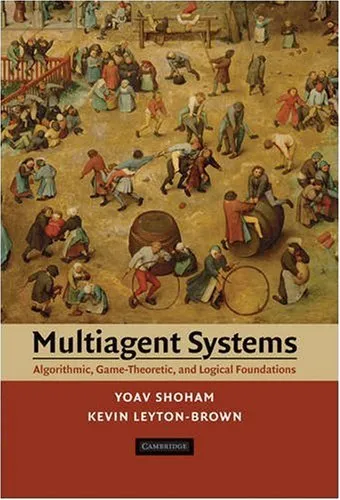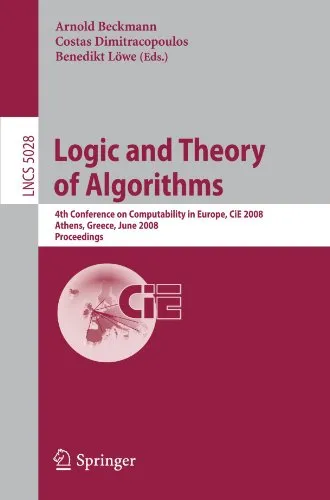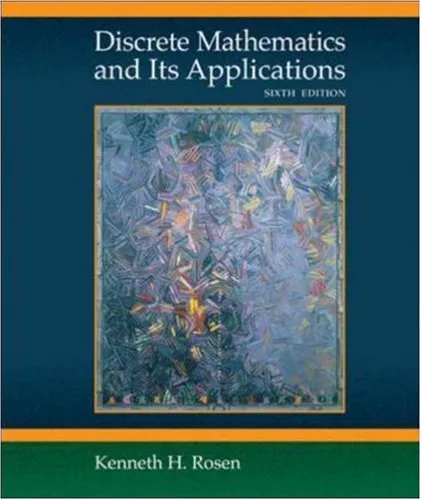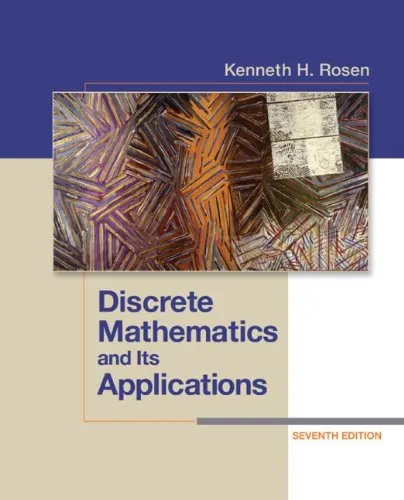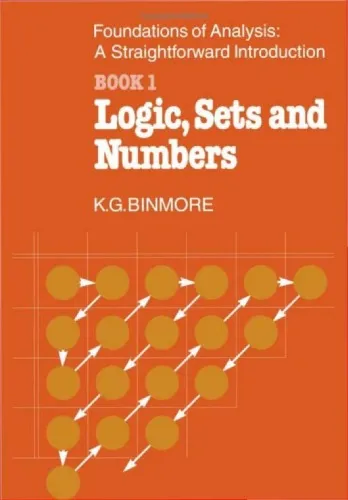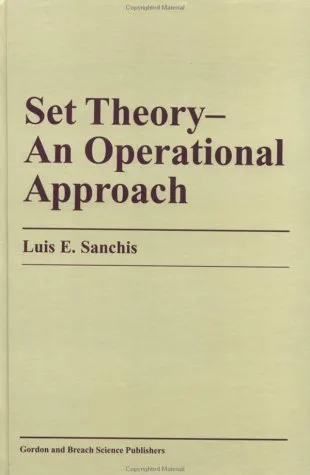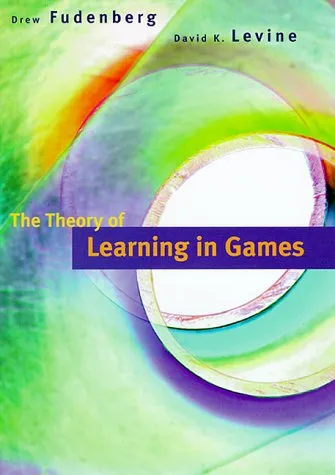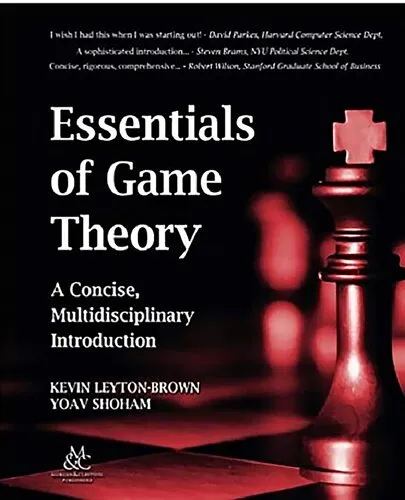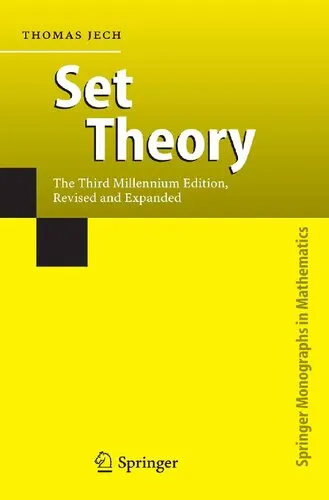Multiagent systems: algorithmic, game-theoretic, and logical foundations
4.7
بر اساس نظر کاربران

شما میتونید سوالاتتون در باره کتاب رو از هوش مصنوعیش بعد از ورود بپرسید
هر دانلود یا پرسش از هوش مصنوعی 2 امتیاز لازم دارد، برای بدست آوردن امتیاز رایگان، به صفحه ی راهنمای امتیازات سر بزنید و یک سری کار ارزشمند انجام بدینکتاب های مرتبط:
معرفی کتاب "Multiagent systems: algorithmic, game-theoretic, and logical foundations"
کتاب Multiagent systems: algorithmic, game-theoretic, and logical foundations اثری شگرف و جامع در زمینه سیستمهای چندعاملی است. این کتاب نوشته Yoav Shoham و Kevin Leyton-Brown بوده و از جمله آثار پایهای در حوزه ترکیب الگوریتمها، نظریه بازیها و منطق در سیستمهای چندعاملی به شمار میرود. نویسندگان در این کتاب به شکلی موثر و کاربردی، به جستار در مفاهیم فنی و بنیادین مرتبط با ایجاد و تجزیه و تحلیل سیستمهایی پرداختهاند که در آنها عاملهای مختلف به تعامل با یکدیگر میپردازند. این کتاب نهتنها برای پژوهشگران علوم کامپیوتر و هوش مصنوعی جذاب است، بلکه برای کسانی که به اقتصاد، ریاضیات یا حتی تصمیمگیری علاقه دارند نیز ارزشمند به شمار میآید.
خلاصهای از کتاب
این کتاب به طور ویژه به بررسی سیستمها یا محیطهایی میپردازد که در آن چندین عامل (agents) به طور مستقل عمل میکنند؛ این عاملها ممکن است افراد، رباتها، یا حتی برنامههای کامپیوتری باشند. موضوع اصلی کتاب نحوه تصمیمگیری این عاملها در مواجهه با سایرین و طراحی الگوریتمهایی است که بتوانند رفتار عوامل را بهینهسازی کنند. در ابتدا، نویسندگان اصول اولیه مانند طراحی الگوریتمها و تعاملات بین عاملها را توضیح میدهند. سپس به موضوعاتی مانند نظریه بازیها و انواع بازیهای مشارکتی و غیرمشارکتی میپردازند. فصلهای پیشرفتهتر کتاب، نظریه مذاکره، سازماندهی عاملها، و مفاهیم پیچیدهتری همچون منطق و reasoning مرتبط با سیستمهای چندعاملی را پوشش میدهند. تأکید اصلی کتاب بر یافتن راهحلهایی است که هم از نظر تئوریک مستحکم و هم از لحاظ عملی قابل پیادهسازی باشند.
نکات کلیدی کتاب
- بررسی جامع ترکیب سه حوزه مهم: الگوریتمها (Algorithms)، نظریه بازیها (Game Theory)، و منطق (Logic).
- ارائه مفاهیم تئوریک به زبانی ساده و همراه با مثالهای کاربردی.
- پوشش موضوعاتی مانند equilibrium concepts، dynamic games، auction theory و voting protocols.
- بحثی پیشرفته در زمینه reasoning در سیستمهای توزیعشده.
- ابزار و چارچوبهایی برای مدلسازی و تجزیه و تحلیل رفتار عاملها.
گزیدههایی از کتاب
“A multiagent system is one that consists of a number of agents, which interact with one another… Each agent’s behavior affects all other agents.”
“The foundation of multiagent settings lies in understanding algorithms, designing incentives, and reasoning logically about agent interactions.”
چرا این کتاب مهم است؟
کتاب Multiagent systems نقشی کلیدی در درک و توسعه سیستمهای پیچیده مبتنی بر تعاملات جمعی دارد. این سیستمها نه تنها در علوم کامپیوتر، بلکه در سایر حوزهها مانند اقتصاد، مدیریت و حتی علوم اجتماعی اهمیت پیدا کردهاند. این کتاب چارچوبی یکپارچه ارائه میدهد تا طراحی، تحلیل، و فهم رفتارهای چندعاملی ممکن شود. نکته قابل توجه دیگر این است که نویسندگان این اثر، مفاهیم پیچیده را با زبانی روشن و شفاف بیان کردهاند، به طوری که برای طیف گستردهای از مخاطبین، صرفنظر از پیشزمینه علمیشان، قابل استفاده است. در دنیای امروز که همکاری بین انسانها و هوش مصنوعی به یک ضرورت تبدیل شده است، شناخت عمیق از مواجهه سیستمهای چندعاملی گام مهمی در حل مسائل مدرن است و این کتاب یکی از برجستهترین منابع در این زمینه محسوب میشود.
Introduction to 'Multiagent Systems: Algorithmic, Game-Theoretic, and Logical Foundations'
Written by Yoav Shoham and Kevin Leyton-Brown, this seminal book serves as a comprehensive guide to the interdisciplinary field of multiagent systems. It bridges computer science, game theory, and logic, offering a deep exploration of how agents—autonomous entities that perceive and act in an environment—can be designed to reason, interact, and collaborate effectively. Whether you're a researcher, a student, or a professional, this book provides a unified introduction to the underlying concepts that drive multiagent technologies and their applications in real-world scenarios.
Detailed Summary of the Book
At its core, "Multiagent Systems: Algorithmic, Game-Theoretic, and Logical Foundations" is organized around foundational principles in three areas—algorithms, game theory, and logic. Each chapter starts by addressing basic questions, gradually leading the reader to nuanced and advanced concepts. The content is carefully structured to be accessible to readers with diverse backgrounds, blending theoretical depth with practical relevance.
The book begins with an introduction to multiagent systems, establishing the motivations and challenges of designing entities that can think, learn, and collaborate in dynamic environments. Following this, the authors delve deeply into game theory, explaining how agents can model and predict the behavior of others within the framework of strategic interactions. This part introduces key concepts like Nash equilibria, mechanism design, and cooperative game theory.
Next, the book explores algorithms for multiagent systems, ranging from search and planning techniques to machine learning methods for coordination and resource allocation. Crucially, it bridges the gap between theory and practice, showing how these algorithms are applied in domains like robotics, e-commerce, and social computing. Finally, the logical underpinnings of multiagent reasoning are discussed—highlighting formal models of knowledge, belief, and communication. Here, readers learn how logical tools help structure the design and implementation of multiagent systems, particularly in environments that require verification and safety guarantees.
Overall, the book provides a rich foundation in computational techniques, mathematical tools, and conceptual frameworks, presented with clarity and rigor.
Key Takeaways
- Understand the core principles of multiagent systems and their applications in modern computer science.
- Gain expertise in game-theoretic concepts such as Nash equilibrium, mechanism design, and auctions.
- Learn algorithmic methods for managing coordination, communication, and planning among multiple agents.
- Master logical reasoning techniques to model knowledge, beliefs, and interactions among agents.
- Bridge theoretical insights with practical applications in fields such as artificial intelligence, economics, and distributed systems.
Famous Quotes from the Book
Throughout the book, the authors present thought-provoking ideas about the nature of agents and their interactions. Here are some selected excerpts:
“Multiagent systems embody one of the fundamental goals of science: understanding how independent entities can work together.”
“The challenges of multiagent systems can often be understood as a dance between collaboration and competition.”
“To design agents that function in environments as complex as the real world, one must interweave computation, strategy, and logic in equal measures.”
Why This Book Matters
'Multiagent Systems: Algorithmic, Game-Theoretic, and Logical Foundations' is more than just a textbook; it is a cornerstone of multiagent systems research and education. As artificial intelligence increasingly permeates everyday life, understanding how multiple entities—whether machines, humans, or hybrids—interact and collaborate has become a critical challenge. This book provides the conceptual scaffolding needed to address these challenges effectively.
The authors’ interdisciplinary approach reflects the real-world complexity of multiagent systems, combining formal rigor with applied insights. Whether you're developing AI for autonomous vehicles, designing personalized e-commerce recommendations, or analyzing complex social networks, the frameworks and methods in this book are indispensable. Furthermore, its accessible writing style ensures that readers from a variety of fields can grasp the material and apply it in their work.
Ultimately, this book matters because it equips readers with the tools to think critically about autonomy, interaction, and intelligence in modern systems—essential for shaping the future of technology and society.
دانلود رایگان مستقیم
شما میتونید سوالاتتون در باره کتاب رو از هوش مصنوعیش بعد از ورود بپرسید
دسترسی به کتابها از طریق پلتفرمهای قانونی و کتابخانههای عمومی نه تنها از حقوق نویسندگان و ناشران حمایت میکند، بلکه به پایداری فرهنگ کتابخوانی نیز کمک میرساند. پیش از دانلود، لحظهای به بررسی این گزینهها فکر کنید.
این کتاب رو در پلتفرم های دیگه ببینید
WorldCat به شما کمک میکنه تا کتاب ها رو در کتابخانه های سراسر دنیا پیدا کنید
امتیازها، نظرات تخصصی و صحبت ها درباره کتاب را در Goodreads ببینید
کتابهای کمیاب یا دست دوم را در AbeBooks پیدا کنید و بخرید
1346
بازدید4.7
امتیاز0
نظر98%
رضایتنظرات:
4.7
بر اساس 0 نظر کاربران
Questions & Answers
Ask questions about this book or help others by answering
No questions yet. Be the first to ask!
